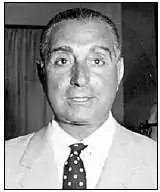Filippo Anfuso
Filippo Anfuso (1 January 1901 – 13 December 1963) was an Italian writer, diplomat and Fascist politician.
Filippo Anfuso | |
|---|---|
 | |
| Born | 1 January 1901 Catania, Sicily, Italy |
| Died | 13 December 1963 (aged 62) Rome, Italy |
| Occupation | Writer, diplomat, Fascist politician |
Anfuso was born in Catania. His writing career started with a volume of short stories and poetry he published in 1917. Anfuso subsequently joined as a reporter with the poet Gabriele D'Annunzio in his attempt to seize Fiume for Italy (1919–1921). He returned to write for La Nazione and La Stampa, reporting from various foreign countries. A friend of Galeazzo Ciano, the two passed the exam for a career in diplomacy at the same time (in 1925).
Anfuso was appointed to the Italian Consulate in Munich (1927), then to the missions in Hungary (1929), Germany (1931), the Republic of China (1932), and Greece (1934). In 1936, Anfuso was seconded to Francisco Franco's side during the Civil War. He was decorated for merit. In 1938, after Ciano was appointed Minister of Foreign Affairs, Anfuso became Ministry head of staff.
In 1942 he became Minister in charge of the Italian Legation in Budapest. In 1943, after Mussolini escaped to Northern Italy with Nazi backing, Anfuso served as a diplomat for the newly founded Italian Social Republic, representing it in Berlin. As Ambassador in Berlin, he took care of the problems related to the presence in Germany of thousands of Italian servicemen deported after the 1943 Armistice. His role in trying to protect some Jews persecuted by the Nazis was mentioned during the Eichmann trial held in Israel in 1961. In 1945, he replaced the deceased Serafino Mazzolini as undersecretary for the Republic's Foreign Affairs Ministry.
When the war ended in Italy's defeat, Anfuso made his way to France, but was soon recognized and arrested. He spent two years in prison, and after having been fully cleared by the French courts, he then exiled himself to Madrid. In 1950, he returned to Italy, going back to journalism and publishing several books. Having adhered to the Neo-fascist Italian Social Movement, he represented it in the Italian Chamber of Deputies. Anfuso died in 1963, aged 62, while speaking on the floor in the Parliament in Rome.
Family
On 13 April 1944, in Berlin, Germany, Anfuso married Kornélia "Nelli" Tasnady-Szüts (died 1995, Rome). In 1948, they had a daughter, Carmelina (died 2000, Rome), and, in 1951, a son, Francesco (died 1968, Abruzzi).
References
- Albanese, Matteo, & Pablo del Hierro (2016) Transnational Fascism in the Twentieth Century: Spain, Italy and the Global Neo-Fascist Network. (Bloomsbury Publishing). ASIN: B01L92DJJG